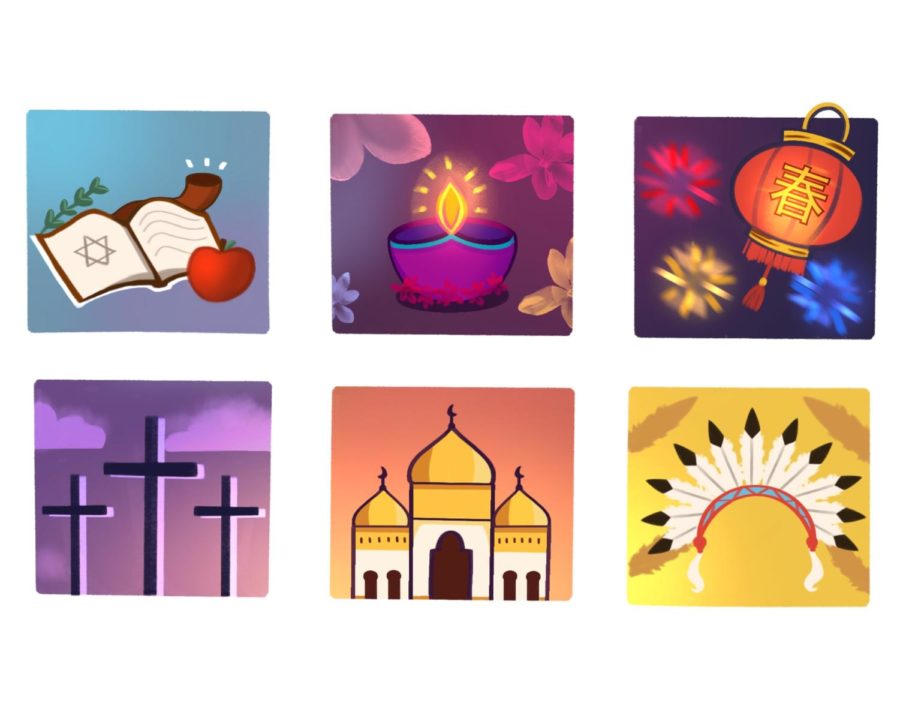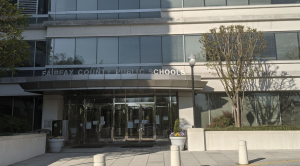Staff Editorial: Teachers should not have to work on student holidays
Illustrated by Rachel Neathery
New policies allow religious days to be holidays for staff and students. However, holidays like Rosh Hashanah, Orthodox Friday, and Eid-al-Fitr, are not off for teachers.
October 25, 2022
While students excitedly celebrate the inclusion of more days off peppered throughout the school year, more than half of the new student holidays require teachers to continue working and coming to school.
Religious observance (RO) days were implemented last year, which allowed teachers to celebrate these holidays because they were allowed to make up 16 hours of any time they missed due to the ROs, according to Patch. This year, Fairfax County Public Schools (FCPS) has caught up with nearby counties, making Rosh Hashanah, Yom Kippur, Diwali, Orthodox Good Friday and Eid-al-Fitr into full day holidays, however some of these holidays are student-only. FCPS will also recognize Lunar New Year as a holiday in following years, as it falls on a non-school day in the 2022-2023 school year. Other holidays that students have off this year include Indigenous Peoples Day and Veterans Day.
However, Rosh Hashanah, Indigenous Peoples Day, Orthodox Good Friday and Eid-al-Fitr are only holidays for students, and are professional workdays for teachers, who either have to come into work or take time off if they celebrate those days. Many of these holidays have full-day celebrations.
For Jewish teachers working during Rosh Hashanah, they miss out visiting the synagogue, where, according to Chabad, in celebration of the holiday, there is a shofar-blowing ceremony, along with a longer morning service. On Orthodox Good Friday, many Greek Orthodox Christians celebrate the day by fasting and spending time with their family, per Time and Date. Eid-al-Fitr is a three day long celebration in which Muslims take part in morning prayers, meet their family and friends and celebrate with gifts and special food, according to History.
According to a research study in 2014 by Pew Research Center, Jewish adults make up 4%, Orthodox Christians make up 2%, and Muslims make up 2% of the Washington, DC metro area. However, Hindu adults only make up 1% of the Washington, DC metro area, yet Diwali is now a holiday for both teachers and students.
Seeing that Jews, Orthodox Christians and Muslims are more numerous than Hindu adults, there is a lack of equal religious freedom for all minority groups, and especially when days off are separated between students and teachers.
In addition, for Jewish, Greek Orthodox and Muslim teachers, it is difficult to take time off during these holidays. Professional development days involve meetings and critical tasks for teachers, and so these religious groups have to take personal leave in order to celebrate. However, FCPS employees are only allowed five days of paid personal leave, and having to use that for a holiday is unfair.
In a poll taken of 21 people, 100% of the staff agree with teachers getting holidays on Rosh Hashanah, Orthodox Good Friday and Eid-al-Fitr. With FCPS current policy, certain holidays are split amongst different age groups, even though they are meant to be celebrated together. FCPS should aim to be inclusive for all ages so that the most critical part of holidays- family- is acknowledged and respected.





